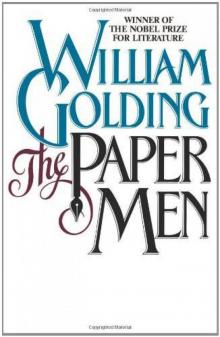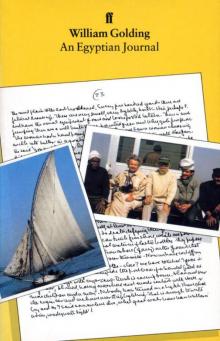- Home
- William Golding
To the Ends of the Earth Page 11
To the Ends of the Earth Read online
Page 11
“This wisdom should be put in a book.”
“Laugh if you will, sir. Today I must not be offended with you.”
“But there is another matter and I had intended to raise it. We have no physician and the man is mortally sick.”
“How can that be? He is young and suffering from no more than over-indulgence in liquor.”
“Still? I have talked with the servant. I have entered the cabin and seen for myself. In many years of service neither Phillips nor I have seen anything like it. The bed is filthy, yet the man, though he breathes every now and then, does not stir in it. His face is pressed down and hidden. He lies on his stomach, one hand above his head and clutched into the bolster, the other clutching an old eyebolt left in the timber.”
“I marvel you can eat after it.”
“Oh that! I tried to turn him over.”
“Tried? You must have succeeded. You have three times his strength.”
“Not in these circumstances.”
“I own, Mr Summers, that I have not observed much intemperance in Colley’s line of life. But the story goes that the Senior Tutor at my own college, having dined too well before a service, rose from his seat, staggered to the lectern, slumped, holding on to the brass eagle and was heard to mutter, ‘I should have been down had it not been for this bleeding Dodo.’ But I daresay you never heard the story.”
Mr Summers shook his head.
“I have been much abroad,” he replied gravely. “The event made little noise in that part of the Service where I then was.”
“A hit, a palpable hit! But depend on it, young Colley will lift up his head.”
Summers stared into his untouched glass.
“He has a strange power. It is almost as if the Newtonian Force is affected. The hand that holds the eyebolt might be made of steel. He lies, dinted into his bunk, drawn down into it as if made of lead.”
“There he must stay then.”
“Is that all, Mr Talbot? Are you as indifferent to the man’s fate as others are?”
“I am not an officer in this ship!”
“The more able to help, sir.”
“How?”
“I may speak to you freely, may I not? Well then—how has the man been treated?”
“He was at first an object of one man’s specific dislike, then an object of general indifference that was leading to contempt even before his latest—escapade.”
Summers turned and stared out of the great stern window for a while. Then he looked back at me.
“What I say now could well ruin me if I have misjudged your character.”
“Character? My character? You have examined my character? You set yourself up—”
“Forgive me—nothing is further from my mind than offending you and if I did not believe the case desperate—”
“What case, for God’s sake?”
“We know your birth, your prospective position—why—men—and woman—will flatter you in the hope or expectation of gaining the governor’s ear—”
“Good God—Mr Summers!”
“Wait, wait! Understand me, Mr Talbot—I do not complain!”
“You sound uncommonly like a man complaining, sir!”
I had half-risen from my seat; but Summers stretched out his hand in a gesture of such simple—“supplication” I suppose I must call it—that I sat down again.
“Proceed then, if you must!”
“I do not speak in my own behalf.”
For a while we were both silent. Then Summers swallowed, deeply as if there had been a real drink in his mouth and that no small one.
“Sir, you have used your birth and your prospective position to get for yourself an unusual degree of attention and comfort—I do not complain—dare not! Who am I to question the customs of our society or indeed, the laws of nature? In a sentence, you have exercised the privileges of your position. I am asking you to shoulder its responsibilities.”
During—it may be—half a minute; for what is time in a ship, or to revert to that strange metaphor of existence that came to me so strongly during Mr Colley’s exhibition, what is time in a theatre? During that time, however long or short, I passed through numberless emotions—rage I think, confusion, irritation, amusement and an embarrassment for which I was most annoyed, seeing that I had only now discovered the seriousness of Mr Colley’s condition.
“That was a notable impertinence, Mr Summers!”
As my vision cleared I saw that the man had a positive pallor under his brown skin.
“Let me think, man! Steward! Another brandy here!”
Bates brought it at the run for I must have ordered it in a more than usually peremptory voice. I did not drink at once but sat and stared into my glass.
The trouble was that in everything the man had said, he was right!
After a while, he spoke again.
“A visit from you, sir, to such a man—”
“I? Go in that stinking hole?”
“There is a phrase that suits your situation, sir. It is Noblesse oblige.”
“Oh be damned to your French, Summers! But I tell you this and make what you choose of it! I believe in fair play!”
“That I am prepared to accept.”
“You? That is profoundly generous of you, sir!”
Then we were silent again. It must have been in a harsh enough voice that I spoke at last.
“Well, Mr Summers, you were right, were you not? I have been remiss. But those who administer correction out of school must not expect to be thanked for it.”
“I fear not.”
This was too much.
“Fear nothing, man! How mean, how vindictive, how small do you think I am? Your precious career is safe enough from me. I do not care to be lumped in with the enemy!”
At this moment, Deverel came in with Brocklebank and some others so that the conversation perforce became general. As soon as possible I took my brandy back to my hutch and sat there, thinking what to do. I called Wheeler and told him to send Phillips to me. He had the insolence to ask me what I wanted the man for and I sent him about his business in no uncertain terms. Phillips came soon enough.
“Phillips, I shall pay a call on Mr Colley. I do not wish to be offended by the sights and smells of a sick-room. Be good enough to clean up the place and, as far as you can, the bunk. Let me know when it is done.”
I thought for a moment he would demur but he changed his mind and withdrew. Wheeler stuck his head in again but I had plenty of rage left over and told him if he was so idle he might as well go across and lend Phillips a hand. This removed him at once. It must have been a full hour before Phillips tapped on my door and said he had done what he could. I rewarded him, then fearing the worst went across the lobby attended by Phillips but with Wheeler hovering as if expecting a half-guinea for allowing Phillips the use of me. These fellows are as bad as parsons over fees for christenings, weddings and funerals! They were disposed to mount guard at the door of Mr Colley’s cabin but I told them to be off and watched till they disappeared. I then went in.
Colley’s hutch was a mirror image of mine. Phillips, if he had not rid it completely of stench, had done the next best thing by covering it with some pungent but not unpleasantly aromatic odour. Colley lay as Summers had said. One hand still clutched what both Falconer and Summers agreed was an eyebolt in the side of the ship. His scrubby head was pressed into the bolster, the face turned away. I stood by the bunk and was at a loss. I had little experience of visiting the sick.
“Mr Colley!”
There was no reply. I tried again.
“Mr Colley, sir. Some days ago I desired further acquaintance with you. But you have not appeared. This was too bad, sir. May I not expect your company on deck today?”
That was handsome enough, I thought in all conscience. I was so certain of success in raising the man’s spirits that a fleeting awareness of the boredom I should experience in his company passed through my mind and took some edge off my
determination to rouse him. I backed away.
“Well sir, if not today, then when you are ready! I will await you. Pray call on me!”
Was that not a foolish thing to say! It was an open invitation to the man to pester me as much as he would. I backed to the door and turned in time to see Wheeler and Phillips vanish. I looked round the cabin. It contained even less than mine. The shelf held a Bible, a prayer book, and a dirty, dog-eared volume, purchased I imagine at third hand and clumsily rebound in brown paper, which proved to be Classes Plantarum. The others were works of devotion—Baxter’s Saints Everlasting Rest, and the like. There was a pile of manuscript on the flap of the table. I closed the door and went back to my hutch again.
Scarce had I got my own door open when I found Summers following me close. He had, it appeared, watched my movements. I motioned him inside.
“Well Mr Talbot?”
“I got no response from him. However, I visited him as you saw and I did what I could. I have, I believe, discharged those responsibilities you were so kind as to bring to my notice. I can do no more.”
To my astonishment he raised a glass of brandy to his lips. He had carried it concealed or at least unnoticed—for who would look for such a thing in the hands of so temperate a man?
“Summers—my dear Summers! You have taken to drink!”
That he had not indeed was seen only too clearly when he choked and coughed at the first taste of the liquid.
“You need more practice, man! Join Deverel and me some time!”
He drank again, then breathed deeply.
“Mr Talbot, you said that today you could not be angry with me. You jested but it was the word of a gentleman. Now I am to come at you again.”
“I am weary of the whole subject.”
“I assure you, Mr Talbot, this is my last.”
I turned my canvas chair round and sank into it.
“Say what you have to say, then.”
“Who is responsible for the man’s state?”
“Colley? Devil take it! Himself! Let us not mince round the truth like a pair of church spinsters! You are going to spread the responsibility, are you not? You will include the captain and I agree—who else?—Cumbershum? Deverel? Yourself? The starboard watch? The world?”
“I will be plain, sir. The best medicine for Mr Colley would be a gentle visit from the captain of whom he stands in such awe. The only man among us with sufficient influence to bring the captain to such an action, is yourself.”
“Then devil take it again, for I shall not!”
“You said I would ‘Spread the responsibility’. Let me do so now. You are the man most responsible—”
“Christ in his heaven, Summers, you are the—”
“Wait! Wait!”
“Are you drunk?”
“I said I would be plain. I will stand shot, sir, though my career is now in far more danger from you than it ever was from the French! They, after all, could do no more than kill or maim me—but you—”
“You are drunk—you must be!”
“Had you not in a bold and thoughtless way outfaced our captain on his own quarterdeck—had you not made use of your rank and prospects and connections to strike a blow at the very foundations of his authority, all this might not have happened. He is brusque and he detests the clergy, he makes no secret of it. But had you not acted as you did at that time, he would never in the very next few minutes have crushed Colley with his anger and continued to humiliate him because he could not humiliate you.”
“If Colley had had the sense to read Anderson’s Standing Orders—”
“You are a passenger as he is. Did you read them?”
Through my anger I thought back. It was true to some extent—no, wholly true. On my first day Wheeler had murmured something about them—they were to be found outside my cabin and at a suitable opportunity I should—
“Did you read them, Mr Talbot?”
“No.”
Has your lordship ever come across the odd fact that to be seated rather than erect induces or at least tends towards a state of calm? I cannot say that my anger was sinking away but it was stayed. As if he, too, wished us both to be calm, Summers sat on the edge of my bunk, thus looking slightly down at me. Our relative positions seemed to make the didactic inevitable.
“The captain’s Standing Orders would seem to you as brusque as he is, sir. But the fact is they are wholly necessary. Those applying to passengers lie under the same necessity, the same urgency, as the rest.”
“Very well, very well!”
“You have not seen a ship at a moment of crisis, sir. A ship may be taken flat aback and sunk all in a few moments. Ignorant passengers, stumbling in the way, delaying a necessary order or making it inaudible—”
“You have said enough.”
“I hope so.”
“You are certain I am responsible for nothing else that has gone awry? Perhaps Mrs East’s miscarriage?”
“If our captain could be induced to befriend a sick man—”
“Tell me, Summers—why are you so curious about Colley?”
He finished his drink and stood up.
“Fair play, noblesse oblige. My education is not like yours, sir, it has been strictly practical. But I know a term under which both phrases might be—what is the word?—subsumed. I hope you will find it.”
With that, he went quickly out of my hutch and away somewhere, leaving me in a fine mixture of emotions! Anger, yes, embarrassment, yes—but also a kind of rueful amusement at having been taught two lessons in one day by the same schoolmaster! I damned him for a busybody, then half undamned him again, for he is a likeable fellow, common or not. What the devil had he to do with my duty?
Was that the word? An odd fellow indeed! Truly as good a translation as yours, my lord! All those countless leagues from one end of a British ship to the other! To hear him give orders about the deck—and then to meet him over a glass—he can pass between one sentence and the next from all the jargoning of the Tarpaulin language to the plain exchanges which take place between gentlemen. Now the heat was out of my blood I could see how he had thought himself professionally at risk in speaking so to me and I laughed a little ruefully again. We may characterize him in our theatrical terms as—enter a Good Man!
Well, thought I to myself, there is this in common between Good Men and children—we must never disappoint them! Only half of the confounded business had been attended to. I had visited the sick—now I must try my influence in adjusting matters between Colley and our gloomy captain. I own the prospect daunted me a little. I returned to the passenger saloon and brandy and in the evening, to tell the truth, found myself in no condition to exercise judgement. I think this was deliberate and an endeavour to postpone what I knew must be a difficult interview. At last I went with what must have been a stately gait to my bunk and have some recollection of Wheeler assisting me into it. I was bosky indeed and fell into a profound sleep to wake later with the headache and some queasiness. When I tried my repeater I found it was yet early in the morning. Mr Brocklebank was snoring. There were noises coming from the hutch next to mine from which I inferred that the fair Zenobia was busy with yet another lover or, it may be, client. Had she, I wondered, also wanted to reach the governor’s ear? Should I one day find myself approached by her to get an official portrait of the governor executed by Mr Brocklebank? It was a sour consideration for the early hours that stemmed straight from Summers’s frankness. I damned him all over again. The air in my hutch was thick, so I threw on my greatcoat, scuffed my feet into slippers and felt my way out on deck. Here there was light enough to make out the difference between the ship, the sea, and the sky but no more. I remembered my resolution to speak with the captain on Colley’s behalf with positive revulsion. What had seemed a boring duty when I was elevated with drink now presented itself as downright unpleasant. I called to mind that the captain was said to take a constitutional on the quarterdeck at dawn, but such a time and place was too earl
y for our interview.
Nevertheless, the early morning air, unhealthy as it may have been, seemed in a curious way to alleviate the headache, the queasiness and even my slight uneasiness at the prospect of the interview. I therefore set myself to marching to and fro between the break of the quarterdeck and the mainmast. While I did so, I tried to see all round the situation. We had yet more months of sea travel before us in the captain’s company. I neither liked nor esteemed Captain Anderson nor was able to think of him as anything but a petty tyrant. Endeavour—it could be no more—to assist the wretched Colley could not but exacerbate the dislike that lay just beyond the bounds of the unacknowledged truce between us. The captain accepted my position as your lordship’s godson, et cetera. I accepted his as captain of one of His Majesty’s ships. The limit of his powers in respect of passengers was obscure; and so was the limit of my possible influence with his superiors! Like dogs cautious of each other’s strength we stepped high and round each other. And now I was to try to influence his behaviour towards a contemptible member of the profession he hated! I was thus, unless I was very careful, in danger of putting myself under an obligation to him. The thought was not to be borne. At one time and another in my long contemplation I believe I uttered a deal of oaths! Indeed, I had half a mind to abandon the whole project.
However, the damp but soft air of these latitudes, no matter what the subsequent effect on one’s health, is certainly to be recommended as an antidote to an aching head and sour stomach! As I came more and more to myself I found it more and more in my power to exercise judgement and contemplate action. Those ambitious of attaining to statecraft or whose birth renders the exercise of it inevitable would do well to face the trials of a voyage such as ours! It was, I remember, very clearly in my mind how your lordship’s benevolence had got for me not only some years of employment in a new and unformed society but had also ensured that the preliminary voyage should give me time for reflection and the exercise of my not inconsiderable powers of thought. I decided I must proceed on the principle of the use of least force. What would move Captain Anderson to do as I wished? Would there be anything more powerful with him than self-interest? That wretched little man, Mr Colley! But there was no doubt about it. Whether it was, as Summers said, my fault in part or not, there was no doubt he had been persecuted. That he was a fool and had made a cake of himself was neither here nor there. Deverel, little Tommy Taylor, Summers himself—they all implied that Captain Anderson for no matter what reason had deliberately made the man’s life intolerable to him. The devil was in it if I could find any word to sum up both Summers’s phrase of “Noblesse Oblige ” and mine of “Fair Play” other than “Justice”. There’s a large and schoolbook word to run directly on like a rock in mid-ocean! There was a kind of terror in it too since it had moved out of school and the university onto the planks of a warship—which is to say the planks of a tyranny in little! What about my career?

 Lord of the Flies
Lord of the Flies To the Ends of the Earth
To the Ends of the Earth Free Fall
Free Fall The Paper Men
The Paper Men The Spire
The Spire The Scorpion God: Three Short Novels
The Scorpion God: Three Short Novels The Inheritors
The Inheritors Darkness Visible: With an Introduction by Philip Hensher
Darkness Visible: With an Introduction by Philip Hensher Pincher Martin
Pincher Martin The Pyramid
The Pyramid The Double Tongue
The Double Tongue An Egyptian Journal
An Egyptian Journal Rites of Passage
Rites of Passage Envoy Extraordinary
Envoy Extraordinary